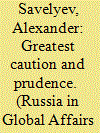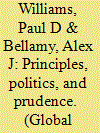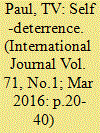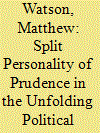| Srl | Item |
| 1 |
ID:
141018


|
|
|
|
|
| Summary/Abstract |
Active arms control negotiations between the Soviet Union and the United States began in 1969. It was not an easy time in relations between the two countries. Therefore, although both parties agreed that the arms race needed to be limited, they tried to condition the talks on the fulfillment of additional requirements: for example, a withdrawal of Soviet troops from Czechoslovakia or termination of U.S. bombings in Vietnam. This bargaining could continue indefinitely. But, thank God, the then Soviet and U.S. leaders -Leonid Brezhnev and Richard Nixon - realized that there were issues that were crucial for the very survival of their countries. So the disarmament issue sidelined even the issue of the Vietnam War. We should not forget that even in the worst of times we were able to launch the long process of dialogue, which per se helped to improve bilateral relations.
|
|
|
|
|
|
|
|
|
|
|
|
|
|
|
|
| 2 |
ID:
190904


|
|
|
|
|
| Summary/Abstract |
This article offers an alternative conceptualisation of prudence as encompassing four normative components: reflective reasoning, experience, long-term well-being, and moderation. Prudence involves a pattern of reflective reasoning informed by experience in the pursuit of long-term well-being through moderate judgements and actions. This conceptualisation allows distilling a set of prescriptions for guiding deliberation and choice under uncertainty, which I name the Prudent Judgement Approach. An analysis of John F. Kennedy's deliberations at the start of the Cuban Missile Crisis uncovers evidence of prudent judgement and demonstrates the practical feasibility and value of this approach. Although the numerous cognitive and procedural sources of errors in decision-making under uncertainty are by now well understood, there are few prescriptive approaches for guiding the process of formulating judgements and making choices. This article shows how prudence can help improve the quality of deliberative processes and policy choices.
|
|
|
|
|
|
|
|
|
|
|
|
|
|
|
|
| 3 |
ID:
114218


|
|
|
| 4 |
ID:
143518


|
|
|
|
|
| Summary/Abstract |
In this article I argue that it is much harder to deter and compel non-nuclear states and terrorist groups through the threat of use of nuclear weapons than proponents of nuclear use contend. A counter-proliferation strategy relying on nuclear threat and preventive war has serious limitations and may well be a source of nuclear proliferation rather than non-proliferation. While the fear of a retaliatory attack constrains a nuclear state from using its nuclear weapons against another nuclear state, a nuclear state may not be able to mount and execute a nuclear retaliatory strike against a non-nuclear state or a non-state actor for reasons beyond military calculations. The nuclear state could be restrained by self-imposed reputational concerns arising from moral, legal, and other normative considerations. This form of restraint can be aptly termed “self-deterrence.” This article first elaborates the concept of self-deterrence and then explores the core reasons for its prevalence. There may be multiple reasons for self-deterrence, including domestic politics, bureaucratic politics, and leaders’ psychology, especially in terms of risk aversion. However, in light of the historical record—especially instances from US nuclear history—reputational considerations appear to be crucial in explaining self-deterrence. These reputational considerations derive largely from three sources: the tradition of non-use of nuclear weapons, moral restraints, and legal principles regarding the use of nuclear weapons. I conclude by arguing that deterrence theory and policy need to take into account this aspect of self-deterrence along with cultural, psychological, and domestic-level constraints that have been presented as challenges to that theory’s premises and applicability.
|
|
|
|
|
|
|
|
|
|
|
|
|
|
|
|
| 5 |
ID:
084382


|
|
|